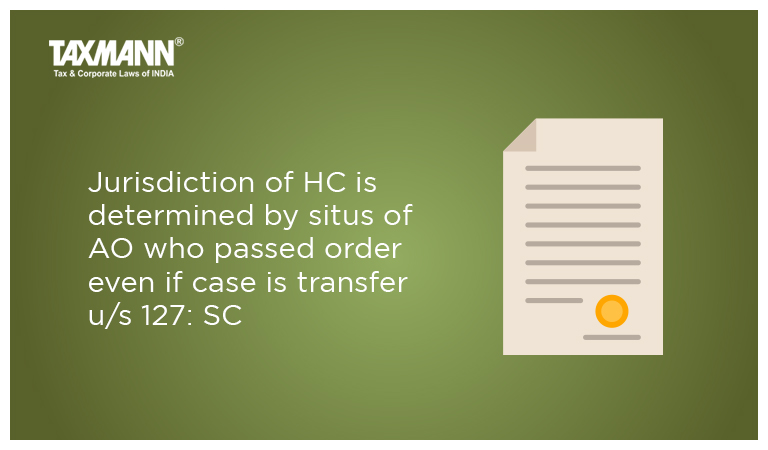Jurisdiction of HC is determined by situs of AO who passed order even if case is transfer u/s 127: SC
- Blog|News|Income Tax|
- 2 Min Read
- By Taxmann
- |
- Last Updated on 22 August, 2022

Case Details: PCIT v. ABC Papers Limited - [2022] 141 taxmann.com 332 (SC)
Judiciary and Counsel Details
-
- Uday Umesh Lalit, S. Ravindra Bhat & Pamidighantam Sri Narasimha, JJ.
Facts of the Case
The question that arise for consideration before Supreme Court was:
“Whether the jurisdiction of the High Court consequent upon administrative order of transfer of a ‘case’ under Section 127 from one Assessing Authority to another Assessing Officer located in a different State.”
The Punjab & Haryana High Court took the view that such a transfer would not change the principle laid down in Seth Banarasi Dass Gupta [1978] 113 ITR 817 (Delhi). However, the Delhi High Court in. Sahara India Financial Corporation Ltd. [2007] 162 TAXMAN 357 (DELHI) and Aar Bee Industries Ltd. [2013] 36 taxmann.com 308 (Delhi) had taken a different view.
Supreme Court Held
The Supreme Court held that the opinion that the Delhi High Court has misread the scope and ambit of Section 127.
The reasoning adopted by the Delhi High Court in Sahara was based only on the meaning that it attributed to the expression ‘cases’ in the Explanation to Section 127(4). The Delhi High Court was of the view that ‘cases’ must include within its sweep, not only the cases pending before the Authorities enlisted under Section 116, but also the proceedings before the ITAT as well as a High Court.
The power of transfer exercisable under Section 127 is relatable only to the jurisdiction of the Income Tax Authorities. It has no bearing on the ITAT, much less on a High Court. If this submission is to be accepted, it will have the effect of the executive having the power to determine the jurisdiction of a High Court. This can never be the intention of the Parliament.
The jurisdiction of a High Court stands on its own footing by virtue of Section 260A read with Section 269. While interpreting a judicial remedy, a Constitutional Court should not adopt an approach where the identity of the appellate forum would be contingent upon or vacillates subject to the exercise of some other power. Such an interpretation will clearly be against the interest of justice.
The Supreme Court held that appeals against every decision of the ITAT shall lie only before the High Court within whose jurisdiction the Assessing Officer who passed the assessment order is situated.
Even if the case or cases of an assessee are transferred in exercise of power under Section 127, the High Court within whose jurisdiction the Assessing Officer has passed the order, shall continue to exercise the jurisdiction of appeal. This principle is applicable even if the transfer is under Section 127 for the same assessment year.
Disclaimer: The content/information published on the website is only for general information of the user and shall not be construed as legal advice. While the Taxmann has exercised reasonable efforts to ensure the veracity of information/content published, Taxmann shall be under no liability in any manner whatsoever for incorrect information, if any.

Taxmann Publications has a dedicated in-house Research & Editorial Team. This team consists of a team of Chartered Accountants, Company Secretaries, and Lawyers. This team works under the guidance and supervision of editor-in-chief Mr Rakesh Bhargava.
The Research and Editorial Team is responsible for developing reliable and accurate content for the readers. The team follows the six-sigma approach to achieve the benchmark of zero error in its publications and research platforms. The team ensures that the following publication guidelines are thoroughly followed while developing the content:
- The statutory material is obtained only from the authorized and reliable sources
- All the latest developments in the judicial and legislative fields are covered
- Prepare the analytical write-ups on current, controversial, and important issues to help the readers to understand the concept and its implications
- Every content published by Taxmann is complete, accurate and lucid
- All evidence-based statements are supported with proper reference to Section, Circular No., Notification No. or citations
- The golden rules of grammar, style and consistency are thoroughly followed
- Font and size that’s easy to read and remain consistent across all imprint and digital publications are applied



 CA | CS | CMA
CA | CS | CMA

Great insights on jurisdiction determination! This clarification on HC’s authority based on the AO’s location, even after transfer under Section 127, is very informative.